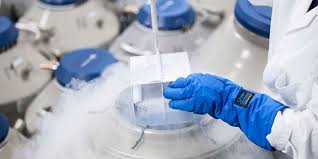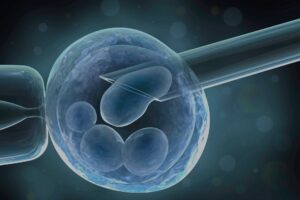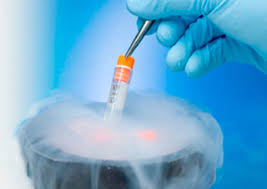Egg Freezing: Preserve Your Fertility for the Future


Getting pregnant is the biggest blessing for a couple. After all, all living beings are given this superpower of reproducing their offspring. But in a few cases, pregnancy cannot be achieved by the couple in natural ways. There can be many reasons for this situation – it can be age health issues or something else.
When a woman’s biological clock is ticking, she must start a family. But you can easily beat the biological ticking of your clock. Yes, this can be possible with the help of egg preservation or freezing of eggs. In this article, we will cover “What is egg freezing”?
Begin your surrogacy journey with IVF Conceptions today!
Mobile: +91-8800481100 ( WhatsApp, Line, Viber)
Email: neelam@ivfconceptions.com
Web: www.completesurrogacy.com
What is egg preservation or oocyte freezing?
It’s a process in which the female eggs are removed from the ovaries and frozen, for oocyte cryopreservation and egg freezing. In the future, a woman will then use them. This technique had previously been experimental. This is also a safe way of resolving some issues of infertility these days.


Identifying the Ideal Candidates
The realm of possibilities offered by egg freezing encompasses a diverse range of scenarios. Candidates who stand to benefit include:
- Cancer Patients: Individuals undergoing chemotherapy or pelvic radiation therapy, both of which may compromise fertility.
- Surgical Cases: Those facing surgeries that could potentially damage the ovaries.
- Genetic Factors: Women with chromosomal abnormalities, such as Turner syndrome or fragile X syndrome, or a family history of early menopause.
- Ovarian Conditions: Individuals with ovarian diseases that pose a risk to ovarian function.
- Genetic Mutations: Cases where genetic mutations necessitate the removal of ovaries, like the BRCA mutation.
- Personal Reasons: Women who choose to delay childbearing due to personal or social considerations.
Why go for egg freezing?
There are various reasons why a woman may freeze her eggs to use them at a later stage. Some of them are as follows –
- Women who want to have a child but have not yet found the right partner can freeze eggs for potential use. Women may even want a baby further down the line in homosexual relations.
- Various health conditions can affect the quality and fertility of eggs, such as endometriosis, causing the development of uterine tissue outside the womb. Freezing eggs provides hope to women with a procedure that decreases fertility.
- A woman’s fertility can be affected by certain cancer treatments, including chemotherapy and radiation. Hence, before the cancer diagnosis, the Egg freezing procedure allows the woman to bear kids later.
- Women who want to go for advanced studies or job should freeze their eggs when young to make sure they have access to safe eggs later.
Additional Guides for Surrogate Mother:
Find a Surrogate Mother With or Without an Agency
In Which Country I Find Low-Cost Surrogate Mothers (in 2023)?
How can I Find a Surrogate Without Agency
What is the Age Limit for Surrogate Mothers
How Much Does Surrogacy Cost Using Family Member
How to Start the Gestational Surrogacy Process? A step-by-step guide for Beginners
How Much Does Surrogacy Cost? Everything You Need To Know (in 2023)


What is the egg-freezing process?
If you are planning to freeze your eggs, the below step by process of egg freezing might help you to understand the whole process:
#1. Screening for egg freezing procedure
It is mandatory to go for some tests before going for the procedure of egg freezing. These screening procedures are –
- Screening for infectious diseases – In this type of screening a woman is screened for various diseases such as HIV, Hep B, Hep C, and so on.
- Ovarian reserve testing – The findings of this test help to assess the ovaries’ reaction to fertility drugs and to forecast them. For this test, the AMH ( Anti-Mullerian Hormone) test with the AFC ( Antral follicular scan) is conducted. The quality and amount of eggs produced by the woman are tested.
#2. Induction of ovulation
The procedure starts with in vitro fertilization, as a result of four to six weeks of hormonal injections before egg recovery. Typically, the process involves self-administered hormone injections and birth control pills, two or four weeks of which leads or natural hormones temporarily “switching off” and creating one of these hormones during the menstrual cycle. The process then continues for 10 to 14 days.

 #3. Egg retrieval stage
#3. Egg retrieval stage
This procedure is carried out under mild anesthesia. Typically, doctors prefer transvaginal ultrasound.
An ultrasound-guided procedure is done to access the follicles during this operation. The doctor then directs a delicate needle into the vagina.
The eggs are removed from the follicles very carefully by using a suction device that is connected to the needle. In 20 to 30 minutes, this process can collect several eggs.
If the doctor has difficulty with access by transvaginal ultrasound to the ovaries, the laparoscopy procedure is used to direct the positioning of the needle. In this way, an injection into the belly button is made of a laparoscope.
#4. Freezing of eggs
The eggs are frozen to a lower temperature (-196 degrees) after collecting the unfertilized eggs. This is done to prevent all biological activity in the egg. The eggs are then stored for future use. There are three ways to freeze your eggs –
- Slow freezing technique -The process consists of using programmable freezers, which freeze the eggs very slowly to avoid the production of intracellular ice crystals. At first, the cryoprotectants are used at a very low concentration in this slow-freezing method. Only when the temperature drops slowly and the metabolism rate for the eggs decreases, is the high level of cryoprotectants used.
- Vitrification method –Eggs are exposed to high levels of cryoprotectants by vitrification which extracts some water from the egg and reduces the possibility of breakage. Afterward, eggs are dipped in a fluid nitrogen bath that freezes the eggs in 2 to 3 seconds. When frozen, it is held at an extremely cool temperature of -196 ° C in liquid nitrogen.

 Cost of egg freezing
Cost of egg freezing
Insurance protection for freezing the eggs usually remains unregulated, though some insurers may help pay for some medicines. Out-of-pocket expense for every egg freezing cycle is between $7,500 to $12,500, for medicines between $2,800 and $5,000.
The cost of egg freezing and storage can go up to $800 each year. It often takes several rounds to collect the 10 to 30 required eggs depending on a woman’s age and the nature of the eggs.
Future Use of Cryopreserved Eggs
When the time comes to utilize cryopreserved eggs for pregnancy, a process unfolds:
- Thawing and Assessment: Cryopreserved eggs are thawed and assessed for viability.
- Fertilization: Intracytoplasmic sperm injection (ICSI) is employed, wherein a single sperm is injected directly into the egg. The fertilized eggs develop in culture until they are ready for transfer into the uterus, typically 3-5 days post-fertilization.
Is egg freezing safe?
Around 5,000 babies were born from frozen eggs. Out of which, more than 900 babies from frozen eggs reported a rise in birth defects in relation to the general population in the most widely published study.
Furthermore, one study shows that there was no increased chromosome defect risk between frozen egg embryos compared with fresh egg embryos. Recent research in 2014 found that risks of pregnancy after freezing were not increased. More than 300,000 children worldwide were also born out of frozen embryos with mostly slow-freeze techniques of cryopreservation, without growing birth defects.
Usually, the doctors advise resting the whole day after a procedure for egg collection. The doctor suggests the drug if the patient is suffering from cramping, discomfort, or soreness, but that disappears within a week. Also, after a week the patient will return to work.
Unveiling Success Rates
Understanding success rates is pivotal:
- Clinical Pregnancy Rates: Current estimates range from 4-12% per oocyte. These rates are expected to evolve with more comprehensive data as egg freezing gains traction.
- Age and Quantity Matter: The two foremost factors influencing live birth probability are the woman’s age at the time of egg freezing and the number of available eggs.
More resources on Egg Donation and Egg Freezing?
How many eggs a woman is born with?
All you need to know about AMH
All you need to know about egg freezing- Type, cost, process

 Conclusion
Conclusion
Is egg freezing right for you? Well, it is a personal choice and decisions need to be made based on your age/professional aspires/ and financial aspects. So, you can choose if you wish to protect your fertility via egg freezing and conceive in later stages via the IVF process.
For some women, this is a mandatory requirement if they wish to build or grow their family. Just to give an example like a cancer survivor, who wishes to freeze her eggs before going to chemotherapy or radiotherapy which might destroy her fertility.
If you’d like to learn more about IVF, Egg Donation, or surrogacy services globally, check out the rest of our website: IVF Conceptions. We offer legally secure and affordable surrogacy consulting services for FREE.
Begin your surrogacy journey with IVF Conceptions today!
Mobile: +91-8800481100 ( WhatsApp, Line, Viber)
Email: neelam@ivfconceptions.com


FAQs for egg freezing process
How does egg freezing work?
Egg freezing, or cryopreservation, involves extracting eggs, cooling them to sub-zero temperatures, and storing them for later use. When needed, the eggs are thawed, fertilized with sperm, and implanted in the uterus.
Who should consider egg freezing?
Women concerned about age-related fertility decline, medical treatments affecting fertility, or personal reasons like career goals or not having a partner, can consider egg freezing.
What is the best age to freeze eggs?
Typically, the late 20s to early 30s is optimal. Egg quality decreases with age, so younger eggs freeze better and offer higher chances of success upon use.
What are the success rates of egg freezing?
Success rates vary but are generally higher with younger eggs. Around an 80% survival rate after thawing and up to 40% chance of pregnancy per thawed egg.
Are there any risks or side effects?
Minor risks like discomfort, bloating, or infection after retrieval. Rarely, ovarian hyperstimulation syndrome (OHSS) can occur.
How much does egg freezing cost?
Costs vary by location and clinic, averaging between $5,000 to $8,000 for the procedure, with additional costs for medications and storage.
Can I still get pregnant naturally after egg freezing?
Yes, egg freezing doesn’t affect natural fertility. However, age-related fertility decline continues, and frozen eggs can offer options if natural conception becomes challenging.
Does insurance cover egg freezing?
Coverage varies. Some insurance plans may cover egg freezing for medical reasons like cancer treatment, but elective egg freezing is often not covered. It’s advisable to check with your provider.